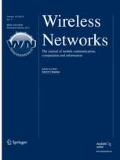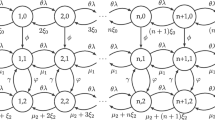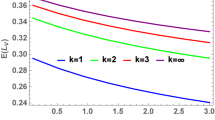Abstract
We develop scheduling strategies for carrying multimedia traffic over a polled multiple access wireless network with fading. We consider a slotted system with three classes of traffic (voice, streaming media and file transfers). A Markov model is used for the fading and also for modeling voice packet arrivals and streaming arrivals. The performance objectives are a loss probability for voice, mean network delay for streaming media, and time average throughput for file transfers. A central scheduler (e.g., the access point in a single cell IEEE 802.11 wireless local area network (WLAN)) is assumed to be able to keep track of all the available state information and make the scheduling decision in each slot (e.g., as would be the case for PCF mode operation of the IEEE 802.11 WLAN). The problem is modeled as a constrained Markov decision problem. By using constraint relaxations (a linear relaxation and Whittle type relaxations) an index based policy is obtained. For the file transfers the decision problem turns out to be one with partial state information. Numerical comparisons are provided with the performance obtained from some simple policies.
Similar content being viewed by others
References
IEEE Standard for Wireless LAN Medium Access Control (MAC) and Physical Layer (PHY) Specifications Nov. 1997, P 802.11.
SP-RFIv1.1-I01-990311, Data-Over-Cable Service Interface Specifications: Radio Frequency Interface Specification 1.1, Mar. 1999
Andrews M., Kumaran K., Ramanan K., Stolyar A., Vijayakumar R., and Whiting P.: Scheduling in a Queueing System with Asynchronously Varying Service Rates. Bell Labs Technical Report, 2000.
Berry Randall A., Gallager R. G.: Communication over Fading Channels with Delay Constraints. IEEE Transaction on Information Theory, vol. 48, no. 5, 1135–1149, May 2002.
J. M. Capone, I. Stavrakakis: Delivering QoS requirements to traffic with diverse delay tolerances in a TDMA environment, IEEE/ACM Transactions on Networking, February 1999.
Dantzig G. B.: Discrete Variable Extremum problems. Operations Research, 5, 1957, 266–277.
Goyal Munish, Kumar Anurag, Sharma Vinod: Power constrained and Delay Optimal Policies for Scheduling Transmission over a Fading Channel. IEEE INFOCOM, 2003.
Ger Koole, Z. Liu, R. Righter: Optimal transmission policies for noisy channels. Operations Research, 49:892–899, 2001
W. K. Kuo, S. Kumar, C. C. Jay Kuo: Improved priority access, bandwidth allocation and traffic scheduling for DOCSIS cable networks, IEEE Transactions on Broadcasting, Dec. 2003.
Jose Nino-Mora: Restless bandits, partial conservation laws and indexability. Advances in Applied Probability, 33(1), 2001, 76–98.
Schal M.: Average Optimality in Dynamic Programming with General State Space. Mathematics of Operations Research, 18(1), 1993, 163–172.
Walrand J.: An Introduction to Queueing Networks. Prentice-Hall, New Jersey, 1988.
Weber R. R. and Weiss G.: On an index policy for restless bandits. J. Appl. Prob., 27, 1990, 637–648.
Whittle Peter: Restless bandits: Activity allocation in a changing world. In A Celebration of Applied Probability, J. Gani (Ed.), J. Appl. Prob., 25A, 1988, 287–298.
Yeh E. M. and Cohen Aaron S.: Throughput and Delay Optimal Resource Allocation in Multiaccess Fading Channels. Proc. of ISIT, Yokohama, Japan, 2003.
Author information
Authors and Affiliations
Corresponding author
Additional information
This work was supported by a research grant from Intel Technology India Pvt. Ltd.
Munish Goyal obtained his Masters and PhD degree in telecommunications from the Indian Institute of Science, Bangalore, India and the B.E. degree in Electronics and Communication from the Indian Institute of Technology, Roorkee, India. Currently, he is a postdoctoral research fellow at the ARC Center of Excellence for Mathematics and Statistics of Complex Systems, University of Melbourne, Australia. His research interests include modelling, analysis and control problems arising in stochastic systems especially telecommunication systems.
Anurag Kumar obtained his B.Tech. degree from the Indian Institute of Technology at Kanpur, and the PhD degree from Cornell University, both in Electrical Engineering. He was then with Bell Laboratories, Holmdel, N.J., for over 6 years. Since 1988 he has been with the Indian Institute of Science (IISc), Bangalore, in the Dept. of Electrical Communication Engineering, where he is now a Professor, and is also the Chairman of the department. From 1988 to 2003 he was the Coordinator at IISc of the Education and Research Network Project (ERNET), India’s first wide-area packet switching network. His area of research is communication networking, specifically, modeling, analysis, control and optimisation problems arising in communication networks and distributed systems. Recently his research has focused primarily on wireless networking. He has been elected Fellow of the IEEE, and the Indian National Science Academy (INSA), both from 2006, and has been a Fellow of the Indian National Academy of Engineering
(INAE) since 1998. He is an associate editor of IEEE Transactions on Networking, and of IEEE Communications Surveys and Tutorials.
He is a coauthor of the advanced text-book “Communication Networking: An Analytical Approach,” by Kumar, Majunath and Kuri, published by Morgan-Kaufman/Elsevier.
Vinod Sharma received his B.Tech in Electrical Engineering from Indian Institute of Technology, New Delhi in 1978 and PhD in Electrical and Computer Engineering from Carnegie Mellon University in 1984. He worked in Northeastern University and University of California at Los Angeles before joining Indian Instutute of Science in 1988 where currently he is a Professor. He has held visiting positions at INRS Montreal, Helsinki University of Technology, Tokyo University of Science, Institute Mittag-Leffler and INRIA, Sophia Antipolis.
His current interests are in Communication Networks, Wireless Communications and Queueing Theory.
Rights and permissions
About this article
Cite this article
Goyal, M., Kumar, A. & Sharma, V. A stochastic control approach for scheduling multimedia transmissions over a polled multiaccess fading channel. Wireless Netw 12, 605–621 (2006). https://doi.org/10.1007/s11276-006-6538-x
Published:
Issue Date:
DOI: https://doi.org/10.1007/s11276-006-6538-x




